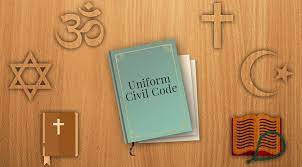The civil code debate
- The Indian Prime Minister recently made a pitch for the Uniform Civil Code (UCC) after the 22nd Law Commission invited the views of the public and "recognised" religious organisations on the UCC within 30 days.
About UCC
- Definition: The idea of having a common code of personal laws for people of all religions.
- Personal law: It includes aspects of inheritance, marriage, divorce, child custody, and alimony.
- Currently, India's personal laws are fairly complex and varied, with each religion following its own specific regulations.
- Constitution of the UCC: Included in Part IV (Directive Principles of State Policy) - Article 44 mentions the State should "endeavour to secure for citizens a Uniform Civil Code throughout the territory of India."
Debate in the Constituent Assembly
- Initially several Muslim members suggested adopting a common civil code with a caveat that it would apply to citizens with prior consent.
- However, BR Ambedkar was strongly opposed to the amendments.
- One member proposed a provision be added stating that "the personal law of any community which has been guaranteed by the statute shall not be changed except with the previous approval of the community.
- Another member from West Bengal said it was not just Muslims who would be inconvenienced by the UCC, as each religious community has its own religious beliefs and practices.
- Finally, Ambedkar, the then Chairman of Drafting Committee, pointed out that barring the NWFP, Muslims in rest of India like Bombay & United Provinces were governed by Hindu law in matters of succession until 1937.
- However, he assured that the UCC would not be enforced upon the people as Article 44 "merely proposes that the State Shall endeavour to secure a civil code".
Take of various Law Commissions
- 2016: A reference was sent by the Ministry of Law and Justice to the Law Commission for examining all matters relating to UCC's implementation.
- 21st Law Commission of India: It issued a consultation paper ‘Reforms of Family Law’ instead of a final report on the issue.
- 22nd Law Commission: It considered it "expedient to deliberate afresh over the subject", in light of its importance, relevance, and also "various court orders on the subject."
“Reforms of Family Law”
- Argued for reforming family laws across religions: It could be done through amendments and codification to limit ambiguity in interpretation and application.
- On social evil practices: It cited that social practices like sati, devadasi, triple talaq, and child marriage do not conform with basic tenets of human rights and nor are they essential to religion.
- No compromise on cultural diversity: While framing laws, it must be remembered that cultural diversity cannot be compromised to the extent that our urge for uniformity becomes a reason for threat to the territorial integrity of the nation.
Conclusion
- Since over three years had lapsed since the paper's publication, the 22nd Law Commission considered it "expedient to deliberate afresh over the subject", in light of its importance, relevance, and also "various court orders on the subject."
- However, even before the UCC was taken up by the Law Commissions, it was extensively deliberated by the judiciary, from as far back as 1952.


